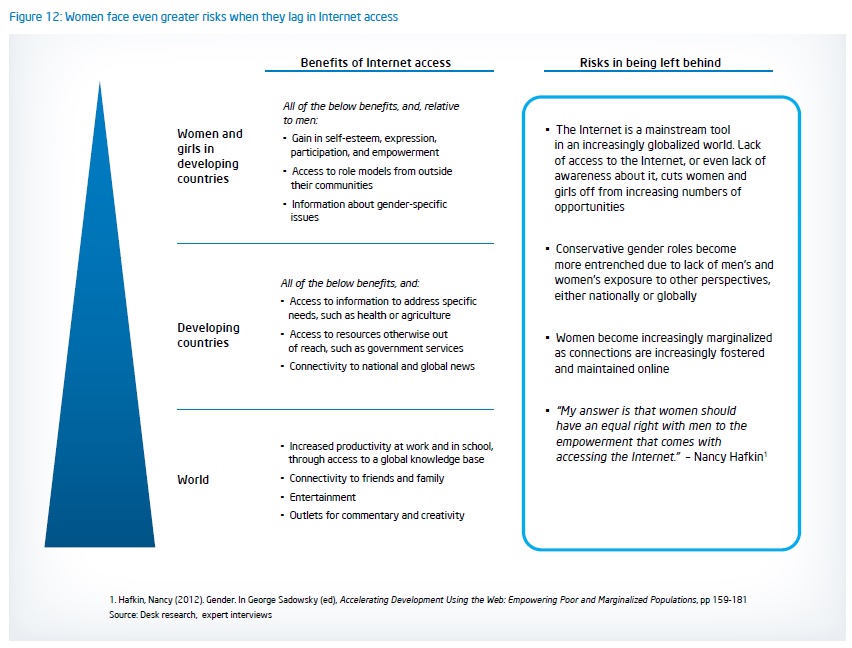Intel’s ‘Women and the Web’ report highlights online habits in Egypt, Uganda
It comes as no surprise that a recent report released by Intel Corporation finds a huge Internet gender gap in Sub-Saharan Africa. According to the report, 45% fewer women in Sub-Saharan Africa have access to the Internet than men. Moreover, one in five women in Egypt believes the Internet is ‘not appropriate’ for them. Such sentiment seems counter-intuitve considering the Internet is regarded as a tool of empowerment. However, internalized gender norms and traditional family expectations limit Internet adoption in many regions and households.
If double the current number of women in developing countries go online, they not only will contribute around $15 billion to annual GDP across 144 countries, but they will find new opportunities to better their lives. Specifically, the Internet enables gains in self-esteem, participation, access to role models from other communities, and information about gender-specific issues. Beyond those first steps, the Internet is powerful in delivering health and agricultural information, along with government services and global news and perspectives.
If we can empower women and girls with the tools, resources and opportunities they need to succeed, we will transform their lives and the lives of everyone they touch.” – Shelly Esque, President Intel Foundation
The hope is this report, and future studies like it, build collaboration among governments, public institutions, corporations, and civil society to prevent a so-called ‘second digital divide’ from leaving women and girls even further behind.
Details from the 104-page report that pertain to Africa – mostly Egypt and Uganda – include:
- Women and girl’s Internet access level in SSA is 9% (Men and boys’ is 16%).
- Women and girl’s Internet access level is 18% in MENA region (28% men and boys’).
- Women’s and girl’s Internet penetration is 32% in Egypt and 9% in Uganda.
- Although Egyptian women face greater gender disparities than other surveyed countries (India, Mexico, Uganda), they have among the highest level of Internet access.
- Uganda got a later start to the Internet than other surveyed countries, but a higher percentage of Ugandan women have Internet access than their Indian counterparts.
- In Uganda, the greatest challenge to women’s Internet access cost. Apart from affordability, many rural women are not aware of how useful the Internet can be.
- 41% of Egyptian women are not interested in the Internet and another 23% feel they don’t need access to the Internet. Of this group, 22% don’t use the Internet due to fear friends/family would disapprove or that it is not appropriate to use the Internet.
- Gender norms play less of a role in Uganda: only 8% of Ugandan women are not interested in the Internet and another 7% feel they don’t need access to the Internet.
- 87% and 96% of surveyed Ugandan women and Egyptian women, respectively, agree that Internet access should be a fundamental right of all people.
- Cyber café use was low in Egypt (6% of respondents) but high in Uganda (60%)
- A decent share of Egyptian women called for new websites only for women or women-only chat options.
- ICT training in rural Uganda caused a shift in womens’ attitudes toward non-digital communication. They came to realize cell phones and radio were not only suitable for men.
- 6% of Egyptian women Internet users had been using the Internet for 6 years or more. The share was 17% in Uganda.
- 66% of Ugandan women use the Internet for studies or education; 37% use it to access government services; 80% use the Internet for entertainment news.
- 22% of Ugandan women use a mobile phone for daily Internet access vs. 14% who use a desktop for daily access.
- In Egypt, 63% of women who use the Internet only on a computer feel the computer is easier to use than a mobile.
- In Uganda, 41% of women have a mobile without Internet access. Only 30% feel a computer is easier to use than a mobile (the opposite of Egyptian women).
- Mobile and desktop are seen as complementary devices, although mobile is the most common access method. In Uganda, 0.facebook.com is reported as a popular web destination.
The report is based on interviews of 2,200 women and girls in mostly urban areas of Egypt, Uganda, Mexico, and India conducted in 2012.













 Twitter
Twitter Facebook
Facebook Pinterest
Pinterest
[…] – Oafrica […]
[…] Intel Women and the Web report found a 43% in internet gender gap in […]